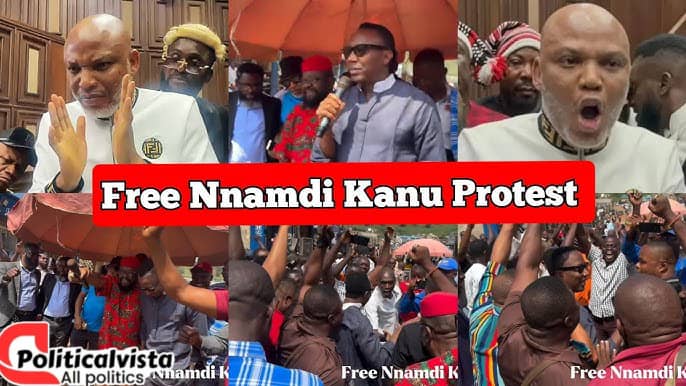
In the heart of Abuja, a storm is brewing, its tendrils reaching far into the southeastern regions of Nigeria, where the echoes of a bygone civil war still linger, haunting the present like a specter. Omoyele Sowore, a human rights activist, has given a clarion call for a protest, demanding the release of Nnamdi Kanu, the leader of the Indigenous People of Biafra (IPOB), from detention. The protest, scheduled for tomorrow, has sparked fears of unrest and violence, with the Nigeria Police Force warning against flouting the injunction stopping the protest.
As the nation stands at this crossroads, the world waits with bated breath, wondering whether Nigeria will find a way to address the grievances of its people or succumb to the pressures of separatism and unrest. One thing is certain: Sowore’s protest is a test of the nation’s resolve, a challenge to its institutions, and a reflection of the deep-seated issues that have been simmering beneath the surface.
The Biafran Question
The Biafran struggle is not merely a quest for territorial independence; it is a cry for recognition, a plea for dignity, and a demand for justice. The Igbo people, bearing the scars of a brutal civil war and systemic marginalization, see in Kanu a champion of their rights, a leader willing to challenge the status quo and confront the Nigerian government head-on.
Kanu’s odyssey began in the quiet town of Isiama Afara Ukwu, Umuahia, Abia State, where the whispers of Biafran independence first seeped into his consciousness, kindling a fire that would soon rage across the nation. His activism, ignited by the perceived marginalization of the Igbo people, found expression in Radio Biafra, a London-based station that became the clarion call for Biafran separatism, its broadcasts weaving a narrative of resistance and self-determination that resonated deeply with the Igbo diaspora.
Sowore’s Call to Action
Sowore, a vocal critic of the Nigerian government, has been a thorn in the flesh of the ruling elite, consistently challenging their authority and pushing for reforms. His call for a protest is not merely a demand for Kanu’s release; it is a challenge to the government’s handling of the Biafran issue, a critique of its human rights record, and a plea for the international community to take notice.
As Sowore takes to the streets, he is not alone. The Coalition of Northern Groups (CNG) has condemned the planned protests, describing them as reckless and provocative. The group urges the government to ensure Kanu’s trial concludes without interference, emphasizing justice must not be swayed by public pressure.
Resistance or Rebellion?
The question on everyone’s lips is: Is Sowore’s protest a legitimate exercise of the right to free speech and assembly, or is it a thinly veiled attempt to foment rebellion? The answer lies in the motivations behind the protest and the manner in which it is conducted.
If the protest is peaceful, law-abiding, and focused on Kanu’s release, it can be seen as a legitimate expression of dissent, a call for the government to reconsider its stance on the Biafran issue. However, if the protest descends into chaos, violence, and anarchy, it will be perceived as a rebellion, an attempt to destabilize the government and challenge its authority.
The Government’s Dilemma
The Nigerian government finds itself in a precarious position, caught between its duty to maintain law and order and its obligation to respect the rights of its citizens. The protest is a test of its resolve, a challenge to its institutions, and a reflection of the deep-seated issues that have been simmering beneath the surface.
As the government grapples with this dilemma, it must consider the long-term implications of its actions. Will it yield to public pressure and release Kanu, or will it stand firm, insisting on the rule of law? The answer will have far-reaching consequences for Nigerian unity, stability, and democracy.
The International Community’s Role
The international community watches with bated breath, aware that the outcome of Sowore’s protest could have far-reaching implications for Nigerian unity and stability. The African Commission on Human and Peoples’ Rights has taken notice, with the Biafra Republic Government in Exile (BRGIE) petitioning the commission to investigate alleged human rights abuses in southeastern Nigeria and appoint a Special Rapporteur to address the situation.
As the world waits with bated breath, it is clear that Sowore’s protest is not just a local issue; it is a global concern, a reflection of the complexities and challenges of nation-building in a diverse and complex society.
Conclusion
Sowore’s protest for Kanu is a test of Nigeria’s resolve, a challenge to its institutions, and a reflection of the deep-seated issues that have been simmering beneath the surface. As the nation stands at this crossroads, it must confront the Biafran question, address the grievances of its people, and find a way to balance its duty to maintain law and order with its obligation to respect the rights of its citizens.
The road ahead is fraught with uncertainty, but one thing is clear: the outcome of Sowore’s protest will have far-reaching consequences for Nigerian unity, stability, and democracy. The world waits with bated breath, wondering whether Nigeria will find a way to address the grievances of its people or succumb to the pressures of separatism and unrest.

Be the first to comment